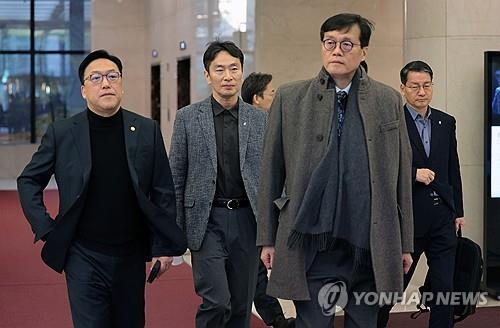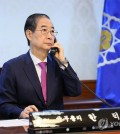- California Assembly OKs highest minimum wage in nation
- S. Korea unveils first graphic cigarette warnings
- US joins with South Korea, Japan in bid to deter North Korea
- LPGA golfer Chun In-gee finally back in action
- S. Korea won’t be top seed in final World Cup qualification round
- US men’s soccer misses 2nd straight Olympics
- US back on track in qualifying with 4-0 win over Guatemala
- High-intensity workout injuries spawn cottage industry
- CDC expands range of Zika mosquitoes into parts of Northeast
- Who knew? ‘The Walking Dead’ is helping families connect
Trump tariffs a bigger concern than martial law crisis for S. Korea: BOK chief
South Korea is in greater jeopardy from U.S. President-elect Donald Trump’s trade policies than from the domestic political turmoil following the martial law imposition, central bank chief Rhee Chang-yong has told the Financial Times.
“There is a lot of uncertainty … But compared with domestic factors, the external factors are giving us a lot more uncertainty at the moment,” Rhee told the British newspaper published Friday.
“(Trump’s tariff threat) is one of the main reasons why we downgraded our growth forecast for this year and next year,” Rhee added.
On Tuesday, President Yoon Suk Yeol declared martial law in a surprise late-night address, which was lifted about six hours later after the National Assembly voted to reject it.
The opposition side filed a motion to impeach Yoon, which is expected to be put to a vote at the National Assembly on Saturday.
Following the turmoil, the Korean won has weakened markedly and the stock market has tumbled on heavy foreign selling.
Rhee acknowledged that the political situation would delay “critical structural reform” to the South Korean economy and financial markets, but its impact on the broader economy would be limited, according to the report.
In an effort to stabilize the markets, the government has vowed to inject “unlimited liquidity” for the time being and the BOK has begun repo operations for financial institutions.
Rhee, Finance Minister Choi Sang-mok and other policymakers have been scurrying to ease mounting concerns among foreign investors and other entities overseas, stressing the country’s economic fundamentals, strong democracy and rules-based order.
Last week, the BOK made a surprise back-to-back policy rate cut, putting policy priority on how to prop up the economy.
Citing slowing export growth and uncertainties surrounding Trump’s policy, the central bank also lowered its growth outlook for this year to 2.2 percent from its previous forecast of 2.4 percent and the forecast for next year by 0.2 percentage point to 1.9 percent.












